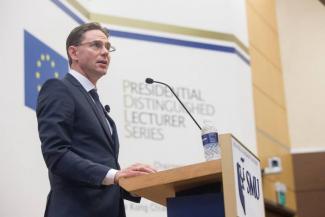
Close to 300 participants from the diplomatic community, various chambers of commerce and business groups in Singapore, as well as the SMU Community attended Mr Jyrki Katainen’s lecture on “Investing in Europe – the way forward” at the Mochtar Riady Auditorium on 25 September 2015.
The 21st speaker of the SMU Presidential Distinguished Lecturer Series (PDLS), Mr Katainen is currently Vice President of the European Commission responsible for Jobs, Growth, Investment and Competitiveness. He joined the Commission in July 2014 as Vice-President for Economic and Monetary Affairs and the Euro. Before assuming his role as Commission Vice President, Mr Katainen served as Prime Minister of Finland (2011 – 2014) and Finance Minister (2007 – 2011). He was a Member of the Finnish Parliament from 1999 – 2014.
In his lecture, Mr Katainen touched on the growing links between the European Union (EU) and ASEAN. He said that the EU is ASEAN's second largest trading partner, and trade has been growing at around 7% a year on average for two decades. The EU is the also the largest provider of Foreign Direct Investment in ASEAN, accounting for almost a quarter of the total.
On EU’s strong economic ties with Singapore, Mr Katainen said, “Out of every Euro we invest in South East Asia, 60 cents are channeled through Singapore. This country also accounts for one quarter of EU-ASEAN merchandise trade, and one third of our trade in services. This makes Singapore our most important economic partner within ASEAN, a true hub for Europe. As the gateway to ASEAN, Singapore accounts for one third of the EU's trade with the region, and two thirds of investment flows. Over 10,000 European companies have set up their regional hub in Singapore, and Singapore is already one of the biggest investors in Europe – the eighth largest in fact – with more than €43 billion of stocks.”

[Caption: Close to 300 participants from the diplomatic community, various chambers of commerce and business groups in Singapore, as well as the SMU Community, attended the lecture.]
Turning to Europe, Mr Katainen said that Europe is moving forward and growth is returning. “Europe continues to be an attractive destination whether you are a refugee, a student or a multinational investor. After all, we are still the world's largest single market with many assets, including the rule of law, innovative and dynamic companies and a highly-skilled workforce,” he said.
Citing a recent Ernst & Young survey of 800 global investors, he said that Europe is ranked as the number one destination, and 59% of those surveyed thought that the attractiveness of Europe as a place for new investment would further increase over the next three years. He added that even as yields are low globally at this point in time, people know that by putting their money in Europe they can expect a return.
He shared the three initiatives which the European Commission has launched to spur investment. First, by setting up the European Fund for Strategic Investments (EFSI) to provide additional risk-bearing capacity and thereby mobilise €315 billion of additional investment; Second, by creating a project portal to showcase potential opportunities, and a new advisory hub to ensure projects are ready for investment; Third, by breaking down long-standing barriers so as to launch a genuine Digital Single Market and Energy Union for the 21st century.

[Caption: Professor Gerry George (left), Dean of SMU Lee Kong Chian School of Business, moderated the Question & Answer session.]
In a lively Question & Answer session, Mr Katainen fielded numerous questions from an enthusiastic audience, including what the Digital Single Market means and what does it look like, how does one invest in EU without a physical presence, how can the ESFI spur innovation in Europe, and how information and communications technology can help with Europe’s structural reforms.
In response to a question on whether the perception of Europe’s inability to get ahead of certain policy challenges would hurt the investment climate, Mr Katainen said, “The (financial) crisis came to Europe from outside, we were badly exposed because countries were not strong enough, countries did not reform themselves early enough. Once stability was shaken by external factors, many countries fell into trouble. EU was a tool to deal with the crisis in Europe. We had quite successfully managed to deal with the crisis, so you can see the stability (has returned) in the financial sector in Europe, and economy in the member states are growing. EU is also a tool for member states to deal with new challenges, such as the migration issue, it is difficult for member state to deal with these challenges alone.”


[Caption: Many interesting questions were posed by an enthusiastic audience during the Q&A session.]
The Presidential Distinguished Lecturer Series was launched in 2005 with the aim of stimulating discussions among faculty, staff and students as well as the larger external audience on issues of contemporary interest and significance. Internationally-renowned and respected academics, scholars and business leaders who have attained prominence in their respective fields, are invited to share their refreshing insights and experience at this lecture series so as to grow and enrich the intellectual capacity and diversity of SMU through interactive discourse.
[Featured photo: Mr Jyrki Katainen delivered the 21st lecture of the SMU Presidential Distinguished Lecturer Series.]